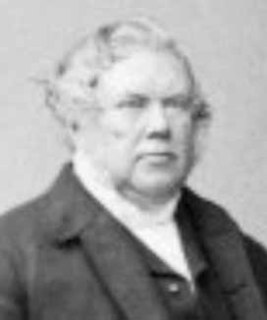Related Research Articles

George Hamilton-Gordon, 4th Earl of Aberdeen,, styled Lord Haddo from 1791 to 1801, was a British statesman, diplomat and landowner, successively a Tory, Conservative and Peelite politician and specialist in foreign affairs. He served as Prime Minister from 1852 until 1855 in a coalition between the Whigs and Peelites, with Radical and Irish support. The Aberdeen ministry was filled with powerful and talented politicians, whom Aberdeen was largely unable to control and direct. Despite his trying to avoid this happening, it took Britain into the Crimean War, and fell when its conduct became unpopular, after which Aberdeen retired from politics.

William Wyndham Grenville, 1st Baron Grenville, was a British Pittite Tory politician who served as Prime Minister of the United Kingdom from 1806 to 1807, but was a supporter of the Whigs for the duration of the Napoleonic Wars. As prime minister, his most significant achievement was the abolition of the slave trade in 1807. However, his government failed to either make peace with France or to accomplish Catholic emancipation and it was dismissed in the same year.

The Treaty of Berlin was signed on 13 July 1878. In the aftermath of the Russian victory against the Ottoman Empire in the Russo-Turkish War of 1877–1878, the major powers restructured the map of the Balkan region. They reversed some of the extreme gains claimed by Russia in the preliminary Treaty of San Stefano, but the Ottomans lost their major holdings in Europe. It was one of three major peace agreements in the period after the 1815 Congress of Vienna. It was the final act of the Congress of Berlin and included Great Britain and Ireland, Austria-Hungary, France, Germany, Italy, Russia and the Ottoman Empire. Chancellor of Germany Otto von Bismarck was the chairman and dominant personality.

Sir Henry Thomas De la Beche KCB, FRS was an English geologist and palaeontologist, the first director of the Geological Survey of Great Britain, who helped pioneer early geological survey methods. He was the first President of the Palaeontographical Society.

Joseph Lancaster was an English Quaker and public education innovator. He developed, and propagated on the grounds both of economy and efficacy, a monitorial system of primary education. In the first decades of the 19th century his ideas found application in new schools established in growing industrial centres.
John Frederick Wolfenden, Baron Wolfenden, CBE was a British educationalist probably best remembered for chairing the Wolfenden Committee whose report, recommending the decriminalisation of homosexuality, was published in 1957. He was headmaster of Uppingham and Shrewsbury private schools.

William Wickham was a British civil servant and politician who was a founder of British foreign secret service activities during the French Revolution, and was later a Privy Counsellor and Chief Secretary for Ireland. He ended his career in government service in 1804, resigning his post in Ireland where, privately, he denounced government policy as "unjust" and "oppressive".

Dawson Turner was an English banker, botanist and antiquary. He specialized in the botany of cryptogams and was the father-in-law of the botanist William Jackson Hooker.
Events from the year 1811 in the United Kingdom. This is a census year and the start of the British Regency.

The Venerable Francis Wrangham was the Archdeacon of the East Riding. He was a noted author, translator, book collector and abolitionist.
Events from the year 1820 in Ireland.

Josiah Forster was an English teacher and philanthropist. He was an early member of the British and Foreign Anti-Slavery Society in 1839 and a supporter of the British and Foreign Bible Society. Both he and his wife were senior figures in the British Quakers.
Henry Dunn may refer to:
Events from the year 1833 in Scotland.

The Revd Dr James Booth, (1806–1878) was an Anglo-Irish clergyman, notable as a mathematician and educationalist.
Edmund Turnor, FRS, FSA, JP, was an English antiquarian, author, landowner and a British politician.
Fanny Hertz was a British educationalist and feminist who worked to establish and promote various institutions for female education in Bradford.
Francis Roger Hodgson was a British Anglican missionary and Bible translator in Zanzibar, and later a parish priest in Devon, England.
Sir Henry Thomas, FBA was an English bibliographer and Hispanic scholar. A graduate of the University of Birmingham, he worked at the British Museum from 1903 to 1947, where he was successively Deputy Keeper (1924–43), Keeper (1943–45) and Principal Keeper (1946–47) of Printed Books. He delivered the Norman MacColl lectures at the University of Cambridge (1917) and the Taylorian Lecture at the University of Oxford (1922), was president of the Anglo-Spanish Society and the Bibliographical Society, was elected a fellow of the British Academy in 1936, and knighted in 1946; he received DLitt degrees from the University of Birmingham and the University of London.

William Henry Kearney, was an English water-colour painter of landscapes and figure subjects.
References
- ↑ "Dunn, Henry (1801–1878), educationist" . Oxford Dictionary of National Biography (online ed.). Oxford University Press. 2004. doi:10.1093/ref:odnb/38813.(Subscription or UK public library membership required.)
- ↑ "Henry Dunn (1801-1878): Educationalist", Claire Grey, Newsletter, Friends of West Norwood Cemetery, No. 95 (May 2019), pp. 7–11.